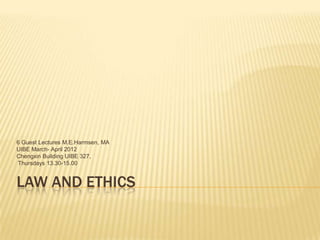
Guest Lectures on Law and Ethics History
- 1. 6 Guest Lectures M.E.Harmsen, MA UIBE March- April 2012 Chengxin Building UIBE 327, Thursdays 13.30-15.00 LAW AND ETHICS
- 2. SHORT INTRO M.E. HARMSEN Political and Societal Ethics, Business Ethics, Philosophy and morale Cross Cultural Philosophy Business Ethics
- 3. LE COURSE OUTLINE AND GOALS LE 1.6. History of Ethics LE 2.6. History of Law LE 3.6. Philosophical challenges part 1 LE 4.6 Philosophical challenges part 2 LE 5.6 Case Studies LE 6.6 Case Studies Three goals for Course LE: 1. Understanding the major dilemma’s 2. Using the knowledge in Law and life 3. Sense of Balance in Life
- 4. LAW AND ETHICS EXCURSE: Legal Framework of Chinese Government Legal Framework of UIBE Moral framework Teacher and students
- 5. LE 1.6 HISTORY OF ETHICS- DEFINITION Ethics= Ethos = way of life, “ the Good life” Science of ethics is the philosophical or religious investigation of a moral order or morally defined set of actions Morally defined; a consciously undertaken action concerning right or wrong in ethical sense.
- 6. LE 1.6 ETHICS- DEFINITION PART 2 1. Practical local regulations 2. Guidelines, giving sense of direction 3. Virtues, wisdom Universal ethics (Confucius, Kant imperative) vs. Territorial , cultural ethics. Ethics are a set of standards, a part of and or above the law(s).
- 7. LE HISTORY OF ETHICS –THE FIRST SYSTEMATIC INVESTIGATIONS Mythology vs Socrates (470-399BC Athens) Socrates on the myths and the gods. Socrates Anthropology (optimistic), ethics by teaching and learning the rational thoughts. Ultimate object is happiness through virtues Plato (427-347 Athens)vs Aristotle (384-322). Plato epistemology is the ratio, or Logos is there before perception and form; the ultimate goal of mankind in resembling the design/form of the Ultimate Good. Aristotle epistemology; extracting from the experiences, we see a design and goal; the human goal is happiness (eudamonia), by living a virtuous and balanced life, and studying philosophy.
- 8. LE 1.6 JUDAISM AND CHRISTIANITY ON ETHICS OT (1500 BC) Ten Commandments, Proverbs 20 v 10 (all are equal),NT (30 AD) Matt 7:12 (Golden Rule). Higher morale than just rules; to see a woman.. August (354-340), pessimistic anthropology, mans design to enjoy God. (de fruitio Dei) Aquino (1225-1274) Epistemology, end of knowledge of man, but also knowledge of God and goodness through nature’s laws. (ius naturae) Calvin (1509-1564) Protestantism, pessimistic anthropology, epistemology, but General Grace
- 9. HUMANISM, KANT AND DEVELOPMENT OF RATIONAL ETHICS Kant (1724-1804) : The categorical imperative (Do not..), rationality as guide for making regulations, two sorts of metaphysics for epistemology. A general revival of Aristotle (optimistic anthropology), but on the other hand „ homo homini lupus‟(Hobbs), universal human rights in developing process due to individualism and humanism, view of law equal for all (Calvin). French Revolution 1789, John Locke (1632-1704) view on government for US
- 10. ATHEISM, SOCIALISM Karl Marx „ Homo economicus‟ and „ ferfremdung‟ resulting in religion. Daniel Dennet, Richard Dawkins, Herman Phillipse„ The Bright‟ on basing their ethics; human ethics: these intelligent primates are fighting for group survival and take consequent action the enforce the idea and diligently preserve their whole race.
- 11. CONFUCIUS (551-479) THROUGH WESTERN EYES The Golden rule and Forgiveness, 6 virtues 1. Ren, human 2. Xiao obey 3. Yi law 4. Li good manners 5. Chun loyalty 6. Shu mutual respect
- 12. SUMMARY HISTORY OF ETHICS- QUESTIONS TO ANSWER: Epistemology- how do we gain knowledge to make the right decision on how to act? Design or goal in Ethics- what is the ultimate goal for living (together)? Anthropology; how do we weigh human moral actions, understanding and knowledge? Two golden rules, to do and not to do.
